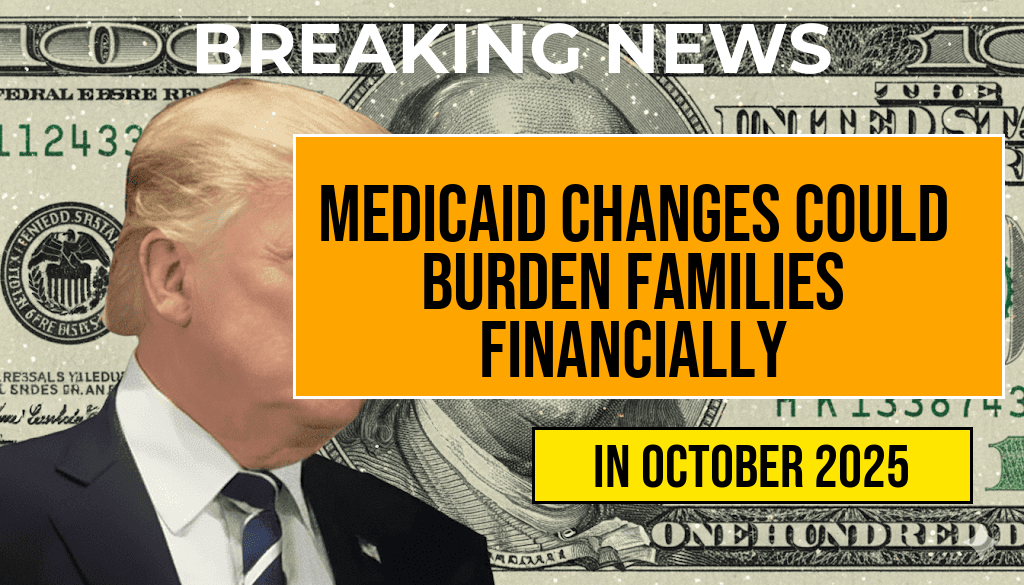Recent changes to Medicaid policies may impose significant financial strain on families, particularly those facing over $5,000 in annual out-of-pocket medical expenses. As states adjust their Medicaid programs, the impact on low-income households is becoming increasingly evident. A new report reveals that approximately one in five families with children enrolled in Medicaid are likely to incur substantial medical costs due to these alterations. With rising healthcare expenses, many families are grappling with the dual challenge of increasing costs and changing eligibility standards, placing them in precarious financial situations.
Understanding the Medicaid Changes
The recent modifications to Medicaid include alterations in eligibility requirements, benefit structures, and cost-sharing components. These changes are being made in several states across the country as part of broader healthcare reforms aimed at improving efficiency and reducing overall spending.
Impact on Low-Income Families
Families with children who rely on Medicaid are particularly vulnerable to these modifications. The report from the Kaiser Family Foundation indicates that many families are already struggling to cover basic healthcare costs. Families who previously faced minimal out-of-pocket expenses may now find themselves responsible for a greater portion of their healthcare bills.
- Increased Out-of-Pocket Costs: Families may need to pay higher premiums and deductibles.
- Reduced Benefits: Some states are cutting back on services covered under Medicaid, forcing families to seek alternative and often more expensive options.
- Eligibility Changes: Stricter eligibility criteria may lead to families losing coverage altogether, leaving them without necessary medical support.
Financial Strain on Households
The financial burden imposed by these changes can be particularly difficult for families already living paycheck to paycheck. For those with chronic health conditions, the potential for increased medical expenses can lead to impossible choices between essential care and other critical needs, such as housing and food.
Case Studies Highlighting the Issue
Several families across the nation have shared their stories, illustrating the real-world implications of these policy changes. For example:
- The Johnson Family: After their state reduced Medicaid coverage, they faced a sudden increase in prescription costs, amounting to over $300 a month.
- The Garcia Family: With their child’s special healthcare needs, the family now anticipates annual expenses exceeding $6,000 due to reduced benefits and higher out-of-pocket maximums.
- The Smith Family: Previously relying on Medicaid for their child’s therapy, they will now need to pay out-of-pocket, which they fear will lead to financial instability.
Policy Responses and Recommendations
Healthcare experts and advocates are calling for immediate policy responses to mitigate the impact on families. Suggestions include:
- Expanding Medicaid Coverage: States should consider broadening eligibility thresholds to ensure more families can access necessary healthcare.
- Increasing Transparency: Clear communication regarding changes in benefits and costs is crucial for families to plan their healthcare expenses.
- Enhanced Support Services: Providing additional resources and support for families navigating these changes can help alleviate some of the financial pressures.
Long-term Consequences
If left unaddressed, the changes to Medicaid could lead to worsening health outcomes for low-income families. According to a study published in PubMed Central, lack of access to affordable healthcare can exacerbate existing health issues, leading to increased hospitalizations and long-term health complications.
| Family Type | Annual Medical Expenses | Percentage Increase |
|---|---|---|
| Single Parent Family | $5,200 | 30% |
| Two-Parent Family | $6,500 | 25% |
| Single Adult Caregiver | $4,800 | 35% |
As states continue to implement these changes, the effects on families will likely become more pronounced. Advocacy groups are pressing for reforms that prioritize health equity and accessibility to ensure that no family is left without essential medical care.
Frequently Asked Questions
What are the recent changes to Medicaid that may impact families?
The recent changes to Medicaid involve adjustments to eligibility criteria and coverage options, which could lead to increased out-of-pocket medical expenses for families, particularly those whose annual expenses exceed $5,000.
How can families manage the financial burden of increased out-of-pocket expenses?
Families can manage the financial burden by exploring financial assistance programs, reviewing their insurance options, and considering budgeting strategies to allocate funds for unexpected medical costs.
What should families do if their annual medical expenses exceed $5,000?
If families find their annual medical expenses exceed $5,000, they should consult with a healthcare navigator or a financial advisor to discuss potential resources and options available to them under the new Medicaid guidelines.
Are there any specific resources available for families affected by these Medicaid changes?
Yes, there are various resources available, including community health centers, non-profit organizations, and online tools that provide information on navigating the complexities of Medicaid changes and financial assistance.
Will these changes to Medicaid affect all families equally?
No, the changes to Medicaid are likely to impact families differently, depending on their unique financial situations, the state they reside in, and the specific medical needs of family members.






